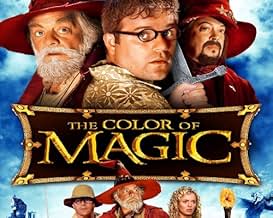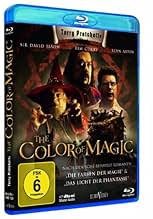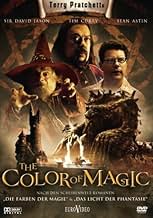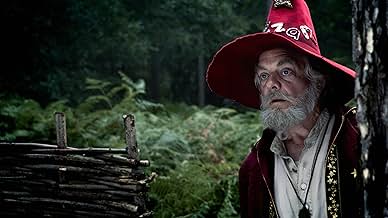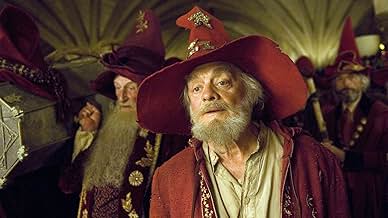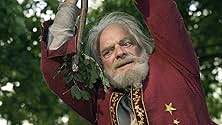Un sorcier poltron se retrouve embarqué malgré lui dans une vie bien trop aventureuse à son goût.Un sorcier poltron se retrouve embarqué malgré lui dans une vie bien trop aventureuse à son goût.Un sorcier poltron se retrouve embarqué malgré lui dans une vie bien trop aventureuse à son goût.
- Nomination aux 1 BAFTA Award
- 1 nomination au total
Parcourir les épisodes
Avis à la une
Attempted to watch this, but the background music was so loud I couldn't hear the narration or dialogue.
Technically, this movie is very good. The effects are well done, with very high quality computer graphics for a "Made for TV" movie, that won't stand behind theatrical release movies. The outdoor scenes were all well produced, placing the actors in a "real" discworld. The customs and environment are in a child-movie style, because of the story's background (it came from a series of books made for children). But that doesn't mean low quality. It just adds to the comical overall feeling of the film. The actors followed this same comical/child-oriented line when playing their roles.
About the story, it never gets boring, and a lot of things happen to the main characters. They practically cross the world in a single adventure, including a journey in "outer space". Multiple parallel plots also take place. In the end, this 3-hour movie entertains you the whole time. The main motivation is very original: following the steps of the first tourist. And the world description is ironically fun.
This story has 2 main perspectives. From the Twoflower point of view, it's a story about having an open mind. One may have much fun and learn a lot when he keeps his mind open to new experiences. From the Rincewood point of view, it shows that one must have persistence; and also that, even in the face of failure, your value doesn't diminish. You're not defined by your failures and/or successes as perceived by the others.
In the end this is a family movie, worth watching by itself, and even more with your children (if you happen to have any).
About the story, it never gets boring, and a lot of things happen to the main characters. They practically cross the world in a single adventure, including a journey in "outer space". Multiple parallel plots also take place. In the end, this 3-hour movie entertains you the whole time. The main motivation is very original: following the steps of the first tourist. And the world description is ironically fun.
This story has 2 main perspectives. From the Twoflower point of view, it's a story about having an open mind. One may have much fun and learn a lot when he keeps his mind open to new experiences. From the Rincewood point of view, it shows that one must have persistence; and also that, even in the face of failure, your value doesn't diminish. You're not defined by your failures and/or successes as perceived by the others.
In the end this is a family movie, worth watching by itself, and even more with your children (if you happen to have any).
I quite liked this film thought I thought some elements of it would be lost on people who haven't read the book since there's only so much exposition you can fit in a film. One of my pet hates is when one of my favourite books gets turned in to a film where the director just can't resist changing every second character and adding entirely new scenes. This kept faithful to the books while still being enjoyable for those who haven't read the books. The version I got on DVD actually comes in two parts with the first part covering the first book - The colour of magic. The second part covers the second book in the series - The light fantastic. Not sure if that's the standard version everyone gets or if some only get part one.
Vadim Jean's second adaptation of Terry Pratchett's longrunning Discworld series of comedic fantasy novels cannot compare to the first, though it is not really his fault. The series adapts Pratchtt's first two novels, The Colour of Magic and The Light Fantastic, which together form a loose single narrative. Set on a typical fantasy realm, replete with trolls, dwarfs and demons, they are, effectively, a parody of the hero's quest, in that the hero, an untalented "wizzard" named Rincewind, has no intention either of being heroic or of going on a quest but ends up fighting monsters, riding dragons and trying to save the world anyway. He is assisted by his "sidekick" Twoflower, who seems only dimply aware that he isn't on a packaged holiday. And that, without mentioning specifics, is the entire plot. Along the way, several fantasy (or perhaps D&D) conventions, such as talking swords, scantily-clad, Heavy Metal-style warrior women, and raging loin-clothed barbarians, are duly referenced and lambasted.
After the relative success of Hogfather in 2006, Vadim Jean decided to take the series in a surprising direction: backwards. Correctly in my view, he chose perhaps the archetypal novel in Pratchett's canon to adapt first. Hogfather was Pratchett at his absolute height, mixing adventure with philosophical commentary and existential humour, the most mature expression of such Discworldly themes of imagination vs. reality, the power of myth vs rationality, and the dichotomy of "the falling angel and the rising ape". "The Colour of Magic" and "The Light Fantastic" were written 25 years ago, when Pratchett was still finding his feet as a writer. As such, they lack some of the sophistication one comes to expect from the series. The books' humour, which would eventually become character and situation-driven, here operates on the level of broad parody, lampooning the absurdities of many fantasy and fairy tale conventions. The characterisation, which would become far more complex in later novels, is as broad as a wall, with Twofower the naive Asian tourist and Rincewind the cowardly non-hero. In a move that was either very wise or bewilderingly silly, Jean decided to cast Sean Astin as Twoflower, even though in the books he is East Asian in appearance. Perhaps this was done to lessen the racial stereotype, but if so, that doesn't reflect well on the source material. His decision to cast the elderly David Jason as Rincewind, who in the books is a youngish man with a scraggly attempt at a beard, is less explicable, other than Jean was simply grateful that Jason wanted to do another series with him.
But if the plot is slight, the actors certainly give it their all. Astin plays Twoflower with just the right kind of naivete, while Jason, though miscast, creates a Rincewind that is suitably cynical and craven. For Pratchett fans, a number of pleasing retcons have been incorporated: The Librarian becomes an orangutan much earlier; Death is now his fully-evolved, pleasantly bemused self, and the Patrician is unquestionably Vetinari, here played by Jeremy Irons- a nod to Pratchett saying that a good actor for Vetinari would be "that guy from Die Hard", ie Alan Rickman.
In summary, I think Pratchett fans will find pleasure in it, but others should probably stay away.
After the relative success of Hogfather in 2006, Vadim Jean decided to take the series in a surprising direction: backwards. Correctly in my view, he chose perhaps the archetypal novel in Pratchett's canon to adapt first. Hogfather was Pratchett at his absolute height, mixing adventure with philosophical commentary and existential humour, the most mature expression of such Discworldly themes of imagination vs. reality, the power of myth vs rationality, and the dichotomy of "the falling angel and the rising ape". "The Colour of Magic" and "The Light Fantastic" were written 25 years ago, when Pratchett was still finding his feet as a writer. As such, they lack some of the sophistication one comes to expect from the series. The books' humour, which would eventually become character and situation-driven, here operates on the level of broad parody, lampooning the absurdities of many fantasy and fairy tale conventions. The characterisation, which would become far more complex in later novels, is as broad as a wall, with Twofower the naive Asian tourist and Rincewind the cowardly non-hero. In a move that was either very wise or bewilderingly silly, Jean decided to cast Sean Astin as Twoflower, even though in the books he is East Asian in appearance. Perhaps this was done to lessen the racial stereotype, but if so, that doesn't reflect well on the source material. His decision to cast the elderly David Jason as Rincewind, who in the books is a youngish man with a scraggly attempt at a beard, is less explicable, other than Jean was simply grateful that Jason wanted to do another series with him.
But if the plot is slight, the actors certainly give it their all. Astin plays Twoflower with just the right kind of naivete, while Jason, though miscast, creates a Rincewind that is suitably cynical and craven. For Pratchett fans, a number of pleasing retcons have been incorporated: The Librarian becomes an orangutan much earlier; Death is now his fully-evolved, pleasantly bemused self, and the Patrician is unquestionably Vetinari, here played by Jeremy Irons- a nod to Pratchett saying that a good actor for Vetinari would be "that guy from Die Hard", ie Alan Rickman.
In summary, I think Pratchett fans will find pleasure in it, but others should probably stay away.
10tbor8
I loved the movie. I saw that people gave comments like "it didn't live up to the accuracy and quality of Hogfather", but what would you expect? Nothing is perfect, and I can't say as a big Discworld fan that I didn't have a lot of fun watching this movie.
I loved all the characters in it, even if they didn't look anything like I had them in my mind.. It is just so great to actually see a movie like this that I am more than willing to forgive little mistakes and changes and enjoy it for what it is.
Great scenery, really amazing, especially for a TV movie. Most of the CGI was very good (except the dragon). Loved the costumes and sets and also the acting was outstanding. All in all, I could not have hoped for anything better and am looking forward to the next adaption, the (currently) latest novel Going Postal. Could've used some CMOT though.. Still a 10 out of 10.
I loved all the characters in it, even if they didn't look anything like I had them in my mind.. It is just so great to actually see a movie like this that I am more than willing to forgive little mistakes and changes and enjoy it for what it is.
Great scenery, really amazing, especially for a TV movie. Most of the CGI was very good (except the dragon). Loved the costumes and sets and also the acting was outstanding. All in all, I could not have hoped for anything better and am looking forward to the next adaption, the (currently) latest novel Going Postal. Could've used some CMOT though.. Still a 10 out of 10.
Le saviez-vous
- AnecdotesSean Astin (Twoflower) and Sir David Jason (Rincewind) are long-term Terry Pratchett fans. Jason named "The Colour of Magic" as his choice of favorite book of all time in the BBC's Big Read survey.
- GaffesWhen Rincewind and Twoflower are tied back-to-back, Rincewind says that "if complete and utter chaos was lightning, then you [Twoflower] would be the sort to stand on a hilltop in a thunderstorm wearing wet copper armor shouting 'All gods are idiots'."; you can tell by the way his mouth moves, however, that he actually says 'All gods are bastards', which is consistent with how it is worded in the novel.
- Crédits fousMucked about by Terry Pratchett.
- ConnexionsFeatured in Terry Pratchett's 'The Colour of Magic': The Making Of (2008)
Meilleurs choix
Connectez-vous pour évaluer et suivre la liste de favoris afin de recevoir des recommandations personnalisées
Détails
- Date de sortie
- Pays d’origine
- Site officiel
- Langue
- Aussi connu sous le nom de
- Discworld
- Lieux de tournage
- Sociétés de production
- Voir plus de crédits d'entreprise sur IMDbPro
- Durée3 heures 11 minutes
- Couleur
- Mixage
- Rapport de forme
- 1.78 : 1
Contribuer à cette page
Suggérer une modification ou ajouter du contenu manquant

Lacune principale
By what name was The Colour of Magic (2008) officially released in India in English?
Répondre

